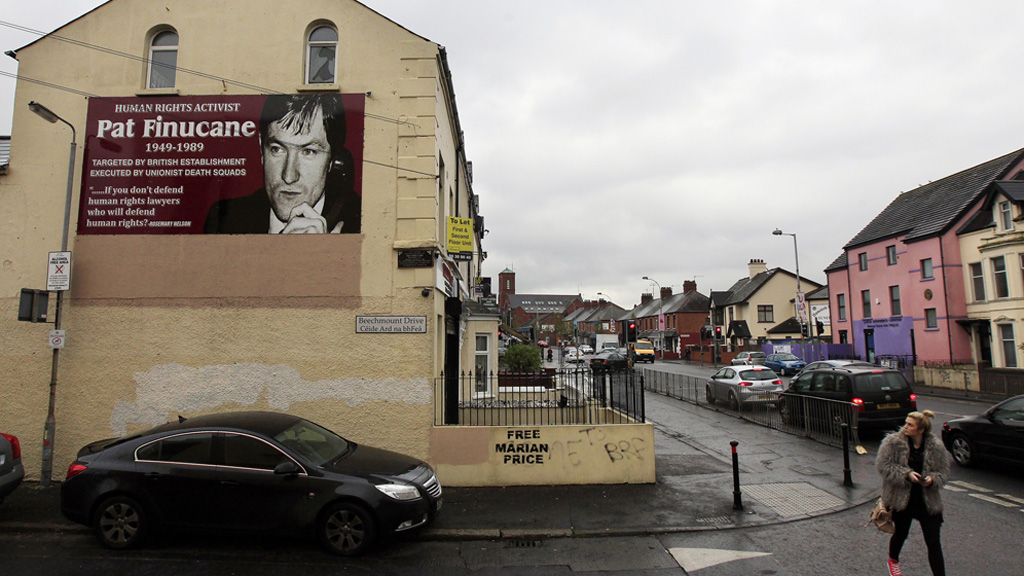Pat Finucane and Northern Ireland’s collusive state
The murder in Belfast of Pat Finucane is totemic because he was seemingly killed at the behest of a corrupt security apparatus. But David Mapstone argues that Northern Ireland is built on collusion.

The atrocious murder of Pat Finucane is – at first sight – a surprising one to have an inquiry into. A vast amount is known about it. We know the name of one of the men who fired the shots and was found guilty of his murder (Ken Barrett), the man who supplied the weapon (William Stobie), and the man who set him up (Brian Nelson).
Was there collusion in his killing? Yes. Several investigations have left no doubt in the matter. All three of those individuals were British agents of one kind or another, and as if to add insult, the organisation which carried out the deed – the vicious loyalist group the UDA – was not even illegal at the time.
Totemic case
The sheer quantity of information surrounding the Finucane death immediately makes it very different from the large majority of the other 3,800 or so murders in Northern Ireland‘s conflict, about which nothing is known at all.
The desire of the Finucane family for an independent inquiry is entirely understandable. Equally understandable is the frustration felt by thousands of others, whose friends and family members are by contrast almost forgotten, with only a poorly resourced Historical Enquiries Team ploughing its way through the Sisyphean task of reinvestigating unsolved murders.
The main reason for the significance of Finucane is that the case has become a totemic one for nationalist Ireland. Here was a solicitor seemingly assassinated at the behest of a corrupt and irredeemably biased security apparatus.
This is a seductive narrative and probably, as far as we can tell, there’s a large amount of truth in it – knowledge of which is presumably why the government has already apologised publicly. Mr Finucane met his death in front of his family in a dark, awful, terrifying night in north Belfast – one among many hundreds, but no less squalid for that.
Multiple collusion
The word collusion is a strange one in Northern Ireland. Collusion took place on multiple levels: there was collusion between the security forces and loyalist groups; collusion between the Irish government of the early 70s and the Provisional IRA; and there was a kind of collusion between mainstream society and the sectarianism that infested it.
Look at Northern Ireland now: the whole state is systemically based on collusion: the population, or most of it, has made a decision that colluding with one’s enemies, regardless of the heinous crimes they’ve committed, is fundamentally worth it.
Middle class people who didn’t carry guns could collude with attitudes, jokes, institutional practices, that sustained the conflict waged by those who, for whatever reason, did carry guns – who often colluded with each other.
And now, the Queen has met Martin McGuinness, and the husband of former Irish president Mary McAleese is reputed to play golf with Jackie McDonald, head of the UDA. These are kinds of collusion – and a very good thing too, most would say.
Human rights?
The same murkiness attaches itself to the phrase “human rights”. Mr Finucane was a (diligent and brilliant) human rights lawyer in the sense in which all lawyers are human rights lawyers; ie, he provided a crucial civic right to people. He provided these rights mainly to Irish republicans and, in particular, the Provisional republican movement.
There is absolutely nothing wrong with this. If he had provided the same services to members of the RUC, it would not make his death any more or less criminal and abhorrent. Human rights were routinely, and horrendously, abused by all sides in the Northern Ireland conflict, not just those acting on behalf of the state.
We should desperately hope that Mrs Finucane and her children find some satisfaction one day from a judicial or quasi-judicial process.
David Mapstone is a senior programme editor with Channel 4 News.